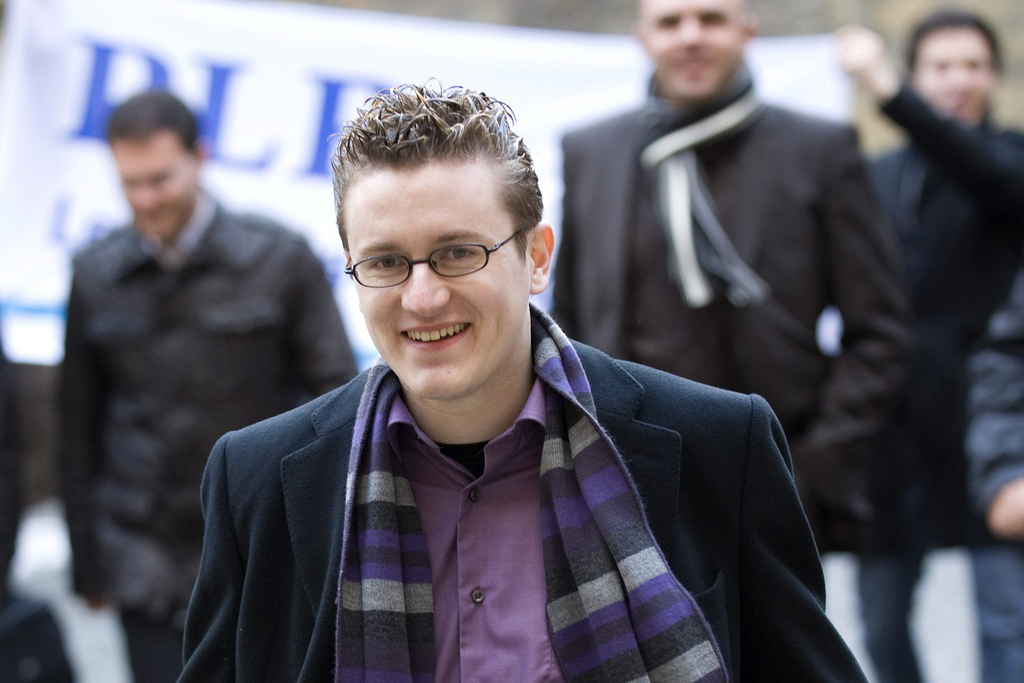
Student senator climbs the political ladder

Raphaël Comte is just over 30 years old and already a senator. His young looks belie an ambitious politician with a remarkable track record in his constituency.
Ahead of his first parliamentary session in Bern, which began earlier this month, the media pointed out that Comte is still a student who lives with his parents and does not yet have a driver’s licence.
His looks are typical of the new generation of the centre-right Radical Party: pastel shirt, striped tie and scarf, gelled hair and the charm of a well-behaved schoolboy.
Comte’s latest political success at the beginning of the year was widely commented on by the newspapers in the French- and the German-speaking parts of the country. Not surprisingly most of them highlighted the obvious points – his youthfulness and his personal background.
He is described as a hard worker but rather dull, not unlike many senior members of the Senate. Comte is by far the youngest member of the chamber but already found his bearings during the first week of the spring session.
Early starter
In a political career that spans almost ten years, Comte has become used to reactions of surprise and scepticism at his youth.
Indeed Comte was the youngest parliamentarian in the history of the Neuchâtel cantonal assembly and the youngest president of the local Radical Party.
He says he is not keen on “the cult of youth nor on the importance that is placed on his age”.
Nevertheless his appointment at the helm of the cantonal party caused a bit of an uproar among the bigwigs of the traditional Neuchâtel Radicals, as local journalists point out.
They also credit him with successfully managing the merger of local Radical and Liberal parties.
Mergers appear to be a key theme of his political career, also in the context of joining local authorities. Comte usually promoted the idea in the name of “increased efficiency”.
Technocrat
Critics have accused Comte of preferring a technocrat’s approach over democratic solutions.
“He had a clear idea of the merger of the communes, but he wanted to impose it from on high, while I preferred a public vote,” says Baptiste Hurni, a senior official of the local centre-left Social Democrats.
Comte often lacks a broad view and ignores social aspects, according to his political rival.
“He does not have much practical professional experience. He never led a company and has not been exposed very much to real problems of the people,” Hurni says.
In the past Comte often supported proposals by the rightwing People’s Party on tax breaks, public spending cuts and debt reduction.
However, Hurni hopes that Comte will adopt a more socially responsible stance as a representative of a region which has been hard hit by the global economic crisis.
Humanist
Humanism – a philosophy that puts human welfare at the centre – has to strike a balance between economic and social interests, according to Comte.
“You cannot share out the riches if they have not been created beforehand. Let’s not forget that the aim of our economic efforts must be to allow people to make a decent living. People have to be able to understand and appreciate this,” he says.
During the first week of the session Comte voted against tougher rules governing unemployment insurance. But he dismisses suggestions that he had primarily humanistic motives for his decision.
“The proposed reform would not really help to cut spending. It merely puts an extra burden on cantons and communes,” he says.
His rejection came despite approval by many of his party colleagues in the Senate.
Comte insists that the Radical Party is not just the mouthpiece of Big Business as he claims to represent the small and medium-sized enterprises and the interests of the self-employed.
Defying the official party line Comte has also come out in favour of setting up a special parliamentary investigation into the government’s handling of the crisis at the UBS bank.
Invited to a comedy show on public radio the young senator recently claimed that politicians “never tell lies”.
Carole Wälti, swissinfo.ch (Adapted from French by Urs Geiser)

More
Senate
Comte is one of 12 Radical Party senators – the second-biggest group in the chamber.
Overall they have 47 seats in both parliament chambers, including the House of Representatives and the Senate and are the third party.
Last year the Radicals merged with the more conservative Liberals in most of the country’s 26 cantons and at a national level.
The Radicals were the founding fathers of modern-day Switzerland in 1848 and traditionally represent the interests of business.
Comte supports increased efforts to introduce e-voting – a long-standing demand of the Swiss Abroad community. His canton is one of the pioneers in this field.
He agrees that the interests of the Swiss Abroad could be better represented if they are guaranteed seats in parliament.
Comte says he learned from swissinfo that there are about 685,000 Swiss expatriates living in all corners of the world.
Comte was born in the French-speaking town of Neuchâtel in 1979.
His political career began at the age of 21 when he joined the local parliament in the commune of Corcelles-Cormondrèche. In 2008 he was elected councilor.
He became the youngest parliamentarian in the history of the Neuchâtel cantonal parliament in 2001 and was named president of his local party three years later.
He won recognition as a promoter of public spending cuts, expert on local authority mergers and supporter of registered gay partnerships.
Comte was appointed to the Senate in January 2010 and replaces Didier Burkhalter who was elected to the cabinet at the end of last year.
(Adapted from French by Urs Geiser)

In compliance with the JTI standards
More: SWI swissinfo.ch certified by the Journalism Trust Initiative































You can find an overview of ongoing debates with our journalists here . Please join us!
If you want to start a conversation about a topic raised in this article or want to report factual errors, email us at english@swissinfo.ch.